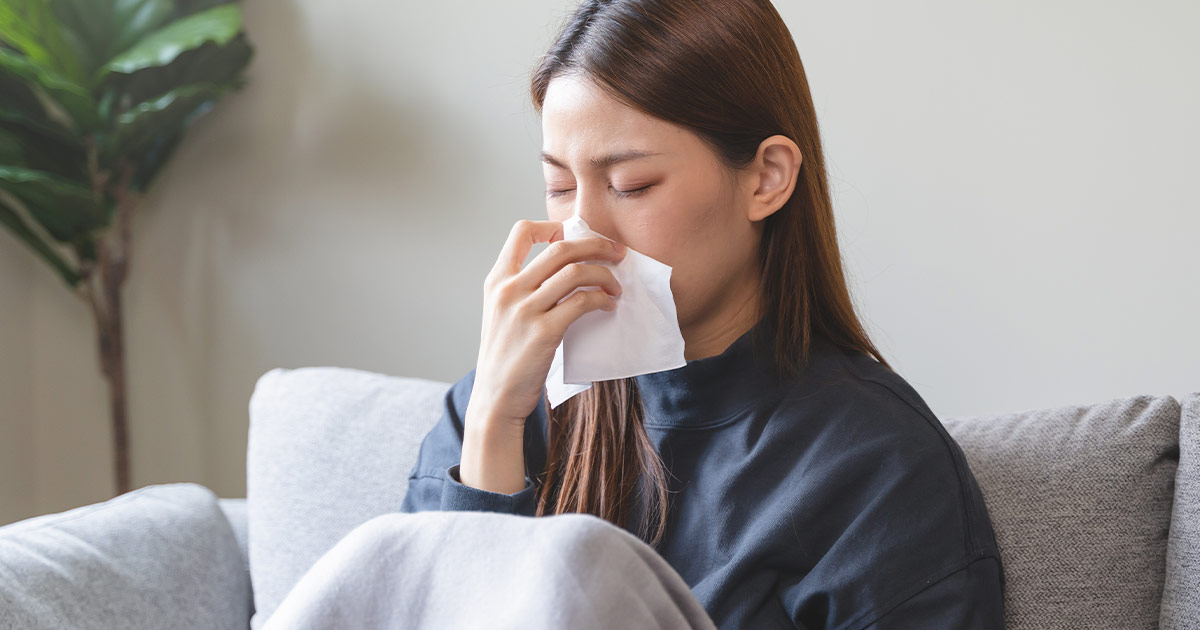Am I sick, or is it simply spring allergies?
With the arrival of spring and gradually warming temperatures, the world is waking up for a new season. Unfortunately for many, this also includes our allergies and springtime illnesses. With a lot of symptoms meaning a whole mess of things, we connected with James Forshee, MD, Senior Vice President and Chief Medical Officer for Priority Health, to learn what folks should be on the lookout for this spring.
ALLERGIES ARE BACK
According to Dr. Forshee, spring allergies are very common and can affect anyone.
"Some of the most common symptoms are sneezing, runny nose, itchy eyes, nasal congestion, sinus pressure and post-nasal drip," Dr. Forshee explained, noting these symptoms are caused by the body's immune system reacting to pollen, mold, dust or other allergens in the air. "Spring allergies can be mild or severe, depending on the person's sensitivity and the level of exposure to the allergens."
The Asthma and Allergy Foundation of America indicated that about 1 in 4 adults and 1 in 5 children suffer from seasonal allergies, and they rank as the sixth most common chronic condition in the country.
So, if you suffer from allergies, you're not alone," Dr. Forshee said, adding that allergy season can vary depending on where you live and what you're allergic to, but generally, there are three main seasons for pollen allergies: spring, summer and fall. "Spring allergies are usually caused by tree pollen, which starts to appear as early as February in some areas and can last until June. Summer allergies are mostly triggered by grass and weed pollen, which peak from May to August. Fall allergies are typically due to ragweed pollen, which begins in late August and can continue until the first frost."
Of course, the timing and intensity of each season can change depending on a number of factors.
WHAT ELSE IS OUT THERE?
While spring is allergy central for a lot of people, there are also a number of viral illnesses to be aware of that could be the cause of some of your symptoms. The first, Dr. Forshee shared, is COVID-19, which can cause fever, cough, trouble breathing and other symptoms that might seem like allergies or a cold. He recommends washing your hands, keeping your distance and getting your vaccine when you can.
Second is the flu, which is caused by different viruses that change every year.
"The flu can make you feel miserable, with fever, chills, sore throat, muscle pain, headache and sometimes stomach problems," Dr. Forshee said. "The flu can also cause complications, like infections or pneumonia, especially if you have other health issues or a weak immune system. The best way to avoid the flu is to get a flu shot every year, which can protect you from getting sick or make your symptoms milder."
And last but certainly not least is the common cold, caused by many viruses that affect your nose and throat.
The common cold can make you sneeze, have a runny nose, a sore throat, a cough and a low fever," Dr. Forshee explained. "Be sure to drink lots of fluids, rest, use nasal sprays or decongestants and take pain medications as needed."
SO, WHICH IS WHICH?
One way to tell the difference between simple allergies or a viral illness, Dr. Forshee said, is to look at the pattern of your symptoms.
"Allergies tend to be seasonal, meaning they happen around the same time every year when certain plants release pollen or mold spores into the air," he said. "Allergies can also be triggered by other things, like dust, pet dander or food. If you have allergies, you might notice that your symptoms get worse when you are exposed to these triggers and get better when you avoid them."
Some simple ways to try and determine the cause of your symptoms is to further ponder what causes what.
Dr. Forshee shared that allergies usually affect your eyes, nose and throat, causing itching, sneezing, runny nose and watery eyes. On the other hand, he emphasized that allergies do not cause a fever or body aches, which are signs of a viral infection. Viral illnesses also usually last longer than allergies and can sometimes lead to complications or hospitalization.
TREATMENT OPTIONS
Thankfully, you've got options for treating your allergies or viral illness this spring.
Dr. Forshee shared that some treatments for both allergies and viral illnesses are over-the-counter medications, such as antihistamines, decongestants or pain relievers, which can help reduce some of the symptoms, such as sneezing, runny nose, headache or fever. He also recommends drinking plenty of fluids, getting enough rest, and avoiding smoking or alcohol, which can worsen symptoms.
"If you have allergies, you might also benefit from nasal sprays, eye drops or allergy shots, which can help prevent or reduce your allergic reaction to certain triggers," he said, also suggesting avoiding or limiting your exposure to the things that trigger your allergies, such as pollen, dust or pets. "If you have a severe or life-threatening allergy, you should always carry an epinephrine auto-injector, which can treat anaphylaxis, a serious allergic reaction that can cause difficulty breathing, swelling or shock."
If your allergy symptoms are too severe for over-the-counter treatment, Dr. Forshee recommends talking to your doctor about whether allergy shots or immunotherapy is right for you.
"If you have a viral illness, you should also monitor your symptoms and seek medical attention if they get worse or do not improve."
STAYING HEALTHY
Thankfully, allergies are not something you have to suffer through. Dr. Forshee shared a number of solutions that are available to help you breathe easier and feel better. Here are a few of his tips to reduce your exposure to allergens and ease your symptoms:
- Check the pollen forecast before you go outside. "You can find it online or on your local news. Pollen levels are usually highest in the morning and on dry, windy days."
- Wear sunglasses and a hat when you're outdoors. "This can help prevent pollen from getting into your eyes and nose."
- Keep your windows and doors closed as much as possible, especially during peak pollen times. "Use air conditioning or a HEPA filter to clean the air inside your home."
- Shower and change your clothes after you've been outside. "This can help wash away any pollen that might have stuck to your skin, hair or clothing."
- Avoid mowing the lawn, raking leaves or gardening when pollen counts are high. "These activities can stir up more pollen and irritate your airways."
- Talk to your doctor about the best medication for your allergies. "Some medications work better for certain people than others, so it's important to find the one that works for you."
Written by Sarah Suydam, Managing Editor for West Michigan Woman.



